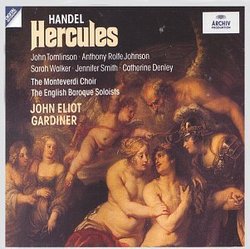| All Artists: George Frideric Handel, John Eliot Gardiner, Anthony Rolfe Johnson Title: Handel: Hercules/Tomlinson, Rolfe Johnson, S. Walker, Smith, Denley, Gardiner Members Wishing: 1 Total Copies: 0 Label: Dg Imports Original Release Date: 1/1/1995 Re-Release Date: 9/1/1995 Album Type: Import Genre: Classical Style: Opera & Classical Vocal Number of Discs: 2 SwapaCD Credits: 2 UPC: 028944768923 |
Search - George Frideric Handel, John Eliot Gardiner, Anthony Rolfe Johnson :: Handel: Hercules/Tomlinson, Rolfe Johnson, S. Walker, Smith, Denley, Gardiner
 | George Frideric Handel, John Eliot Gardiner, Anthony Rolfe Johnson Handel: Hercules/Tomlinson, Rolfe Johnson, S. Walker, Smith, Denley, Gardiner Genre: Classical
|
Larger Image |
CD Details |
CD ReviewsTHE ENGLISH ORPHEUS DAVID BRYSON | Glossop Derbyshire England | 02/22/2005 (5 out of 5 stars) "Hercules is much better heard as an opera rather than as an oratorio. Handel had had well and truly enough of Italian opera, but there was another way of doing it. Hercules is genuine drama unlike, say, Saul which is a kind of animated musical narrative. The difference in approach is vividly clear if we compare the astounding chorus `Jealousy! Infernal pest' in this work with `Envy eldest born of hell' in Saul. The sentiments are much the same, but the ways the composer expresses them could hardly be more different. What Handel had hoped to do in Hercules was to present musical drama without stage action and without the heartache and expense of Italian singers. It is a tragedy of individuals whereas a story based on the Old Testament is always more than that, and the chorus, which always plays a major part in the oratorios, is restricted to a function of summing up the successive stages of the action.
It bombed disastrously at the box-office - the public seemed to feel it was neither one thing nor the other. In sound alone there ought to be no problem in hearing it for what it is. The jealousy felt by Dejaneira for the captive princess Iole has more than a little of the feel of Amneris and Aida to it. The story is based on the Trachiniae of Sophocles via Ovid, and the libretto is by the Rev Thomas Broughton. Broughton is a tenth-rate poet, but actually not a bad librettist. His story-line is clear, his characterisation is consistent and his pacing of the plot really quite good. Even his flat-footed diction, beyond belief uninspired, is at least never absurd. From Handel's point of view all the essentials are there, and he responds to the opportunity with some of the most original music of the entire 18th century. That may actually have been part of his problem with the London public. Handel knew what English taste favoured - music that fell directly on the ear, as he said himself. There are elements of his later style which do not fit a criterion of straightforwardness, and the penalty for that was one he paid again later with his beloved Theodora. Gardiner's direction suits me very well indeed. You will get a greater sense of urgency from Minkowski, but I like the way Gardiner gives the music time to breathe and the development of the plot time to sink in. At the very start I wondered whether the approach was too relaxed, but things livened up considerably with the entry of Hyllus, and at that point I relaxed too and started to go along with Gardiner's way of doing things. There is no lack of vivacity when needed, as you will hear at the chorus `Crown with festal pomp' and elsewhere, and there is real raw power in the scene of the death of Hercules. The cast are without exception excellent, unfailingly secure in their intonation and with the deep sense of 18th century style that we expect from such eminent specialists. I might single out for special praise the fine resonant tone of Tomlinson as Hercules, and maybe most of all Jennifer Smith as Iole, although that could be largely because she gets the gem of all the arias here, `My breast with tender pity'. It is hardly necessary to say how good the instrumentalists are, and the recording captures them all extremely well. I'm not inclined to fret unduly about issues of authenticity and completeness. For one thing it seems to be definitely right to have the part of the herald Lichas as a female role, that being apparently how Handel cast it. There are a few numbers in the score that Gardiner does not include, but without being learned on the issue I would be very surprised indeed if Handel always gave the work in exactly the same form and I'm prepared to take it on faith that there are sound reasons for giving the production as given here. In general the approach is as `authentic' as I would want it. A fine effort all round I should say, even some of the credit going to dear old Broughton." |

 Track Listings (22) - Disc #1
Track Listings (22) - Disc #1